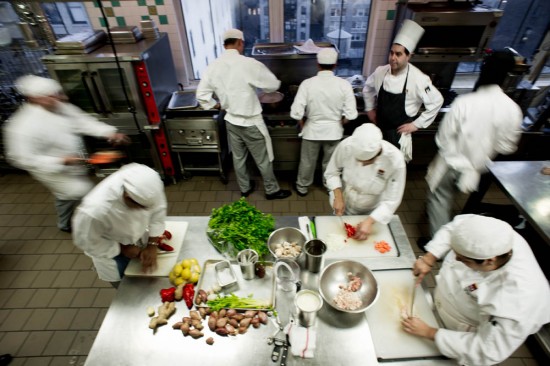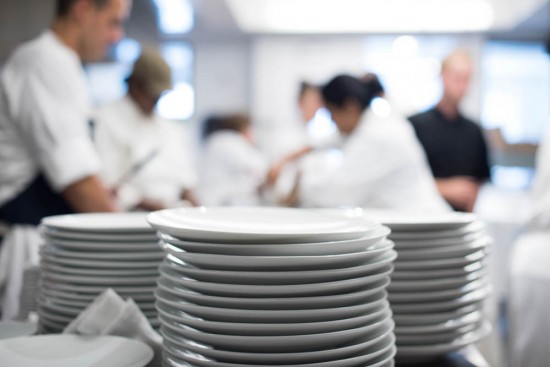
Keeping Your Cool in the Kitchen
To understand the operations side of a professional kitchen is to visualize a complex culinary systems theory, to speculate how one good or bad decision can affect all of the other moving parts. The century-old kitchen structure codified by Auguste Escoffier — still practiced today — evokes the blueprints for a battle scenario. This brigade consists of a chef (always referred to as “Chef” — rarely by his or her name) as the general at the helm with captains (sous chefs), various specialists (fish or meat cooks) and foot soldiers (line cooks) branching out beneath him. Even the physical setup of cooking “on the line” resembles operations in a heavily fortified trench.
The parallels to the military continue from there. Chefs’ uniforms are an indicator of rank. Strategies for success are mapped out in advance; though, in the heat of service, tactics may become more fluid by necessity. Orders are called out and followed in confidence, fear and eagerness to please. There is a strict operational code and teamwork is essential, with little room for niceties when under fire.
In the inevitable rush of battle — where the seemingly disparate notions of speed and accuracy count equally — the weak links are exposed, creating a culture of nightly survival. Interestingly, in a theater dependent on so many small victories and potential defeats, each day begins anew; previous blunders become opportunities to learn, but are never dwelled upon.
Moreover, the kitchen is a noisy place. It takes a fair amount of experience and prolonged immersion in such an environment to truly hear what’s happening, to parse the static of conversation, the hum of equipment, the clanging of pots and the punctuated yells. A degree of sensory overload can overcome you. I find the less I add to the cacophony, the better I am at processing all that information.
Being quiet allows one to feel the underlying rhythm of the kitchen. And, of course, the less energy the cook projects outward, the more he or she can harness that energy and focus it inward. Rather than release it into the air, we ultimately try to put that energy onto the plate. In the process, we become more connected to the work at hand. For seasoned veterans, the act of cooking becomes hardwired into our being, a second nature that links the mental and the physical, manifesting itself as a form of meditation, perhaps even a shift into right brain mode, where time and space become fluid.
While this all may sound poetic, the kitchen can also be an incredibly stressful place to work and requires a certain personality for survival. One of my favorite aphorisms from Fernand Point's Ma Gastronomie says a cook should "never dirty his apron outside of the kitchen."
I've always interpreted this as, “Be cool, don't talk smack and remember that your reputation precedes you both in the kitchen and outside of it.” The way we carry ourselves at work — how we deal with the stress, long hours and other people—reflects upon our character and ultimately dictates that reputation. Of course, this process doesn’t happen in a vacuum.
As cooks — and, in particular, as sous or executive chefs — we are constantly forced to process problems, mistakes and the many special requests that inevitably occur. I'm all for keeping the rules, the standards and the intensity that animate professional kitchens, but I’m less impressed with the bravado and barking that often comes along with it.
Over the years, the futility of such a display has become all the more evident to me. If anything, I simply find it a huge waste of energy, interfering with the sense of economy I like to apply in the kitchen. Fear, humiliation and guilt are not the best motivational tools for young cooks. Typically, aggressive reactions in the kitchen (as anywhere) tend to arise out of frustration, when there is a complete lack of control: a difficult guest in the dining room, a burnt tray of cookies, a stack of broken plates.
But if the damage is already done, what good do anger and yelling do? Does it work toward solving the problem or effectively prevent it from happening again? Probably not.
If we don’t consciously work at interrupting this process, natural human impulses tend to take over in stressful situations, as an extension of fight or flight. Ranting and raving are really just artifice and ornament, unattractive and, in the end, counterproductive. Far from earning respect, it often harbors resentment.
On my end, I've always been fairly mellow. I’ve been intense, as well. In my past, I’ve been too intense in my most ugly moments. I've yelled and stamped my feet when things were not absolutely perfect — far more often than I would like to admit. Inevitably, mistakes do happen. I have tried to handle the worst situations with a stoic acceptance, knowing that it's not going to matter in five seconds.
While the incident that sparked it will quickly be forgotten, a volley of foul language will be remembered. At best, I spin it into sarcasm or humor. At worst, I try a constructive form of tough love. And though I may see a dozen things each day that set me on edge, real change comes not by complaining, but by more thoughtful means. I also find that if I don't whip myself into a frenzy during the day, I sleep better at night.
The turning point in maturity for many chefs is the moment they realize that they are students for life. Though ego plays a role in any skilled profession, great chefs know that their craft is bigger than the place they occupy within it. In those who can withstand the daily pressures, the passion for cooking deepens, becoming not so much a job as a lifestyle. There’s no way to quantify it, but I find that happy cooks — those who have reached this state of self-enlightenment in addition to mastering the fundamental skills — actually make better-tasting food.
Returning to our war metaphor, food doesn’t measure up to far more dangerous occupations, where a good day is one that you're still alive to appreciate. But when you're under the gun for twelve hours at a stretch, it’s easy to feel like the situation is life or death. But the restaurant world is also called the service industry for a reason.
As a leader in the kitchen, I’ve found insight in the words of business expert Seth Godin who writes, “Customers and team members make irrational requests all the time. That doesn't make them unreasonable. If satisfying their request moves things forward, it's not always worth the effort to teach someone a lesson. Sometimes, it's more effective to just embrace their irrationality.
Being right doesn't always have to be the goal.” There are many reasons in life to stick to your principles — war, poverty, injustice of all kinds — but the truth is that most everything that upsets us falls short of that. In the end, it’s just a piece of cake.




